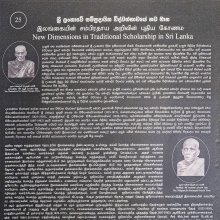Anagarika, Anagārikā: 10 definitions
Introduction:
Anagarika means something in Buddhism, Pali, Hinduism, Sanskrit. If you want to know the exact meaning, history, etymology or English translation of this term then check out the descriptions on this page. Add your comment or reference to a book if you want to contribute to this summary article.
Images (photo gallery)
In Buddhism
Mahayana (major branch of Buddhism)
Source: academia.edu: A Study and Translation of the GaganagañjaparipṛcchāAnagārikā (अनगारिका) refers to “leaving behind ordinary household” (and becoming a monk), according to the Gaganagañjaparipṛcchā: the eighth chapter of the Mahāsaṃnipāta (a collection of Mahāyāna Buddhist Sūtras).—Accordingly: “Son of good family, the king Puṇyālaṃkāra, having seen the Bodhisattva Siṃhavikrāntagāmin’s power of supernatural knowledges, merits and knowledges, handed over the crown to his son called Jayamati. Then, with conviction, he left ordinary household life behind (anagārikā) and became a monk, and thought: ‘[...]’”.

Mahayana (महायान, mahāyāna) is a major branch of Buddhism focusing on the path of a Bodhisattva (spiritual aspirants/ enlightened beings). Extant literature is vast and primarely composed in the Sanskrit language. There are many sūtras of which some of the earliest are the various Prajñāpāramitā sūtras.
General definition (in Buddhism)
Source: Amaravati: Glossary(a nah gah ri ka)homeless one. An Anagarika (male), Anagarika (female) still is technically a lay person, lives in a monastery and follows the Eight Precepts.
Languages of India and abroad
Sanskrit dictionary
Source: DDSA: The practical Sanskrit-English dictionaryAnagārikā (अनगारिका).—The houseless state of a vagrant ascetic.
Source: Cologne Digital Sanskrit Dictionaries: Edgerton Buddhist Hybrid Sanskrit DictionaryAnagārikā (अनगारिका) or Anagāriya.—nt.; anāgāra (nt.); anā- gārikā (= Pali anagāriya or anā°, generally nt.; anagāra nt. only once, Sn 376, otherwise m. and personal, also °rika, adj. and m. subst., personal; °rikā not in Pali), homeless (ascetic) life. In most texts anagārikā (Lalitavistara 18.8; 101.19; 103.20; Divyāvadāna 17.17; 37.12; 141.1; Samādhirājasūtra 8.15, etc.; rare in Mahāvastu, ii.69.1 with v.l. °riya), or anāgārikā (Avadāna-śataka i.136.6, so best ms., text ana°; i.234.1, no v.l.; Bodhisattvabhūmi 26.12; °kāṃ pravrajyāṃ Bhikṣuṇī-karmavācanā 10b.1), are the regular forms, but in Mahāvastu it is almost always anagāriya as in Pali; this has not been noted elsewhere. Regularly in acc. sg. °rikāṃ, °riyaṃ (only once anāgāraṃ [mss., Senart ana°] upetasya Mahāvastu iii.387.1) depending on a form of pra-vraj (rarely of abhi-niṣ-kram, Mahāvastu ii.161.5 ff.), and preceded by abl. (or in Mahāvastu gen.) of agāra, retire from the home to the homeless life. In this phrase the preceding form is always agārād in all texts other than Mahāvastu, and sometimes there (ii.161.5 ff.; iii.408.2); in Mahāvastu also agārato iii.378.4; agārāto iii.176.2; agārebhyo i.128.10; read agārasmā, the Pali form, for agārasthā i.104.8; but most commonly the gen. agārasya i.322.15; 323.1; ii.117.18, 20; 140.3; 271.8; iii.50.11—12; 213.2—3.
--- OR ---
Anāgārikā (अनागारिका).—q.v.
Anāgārikā can also be spelled as Anagārikā (अनगारिका).
Source: Cologne Digital Sanskrit Dictionaries: Monier-Williams Sanskrit-English DictionaryAnagārikā (अनगारिका):—[=an-agārikā] [from an-agāra] f. the houseless life of such an ascetic, [Buddhist literature]
Source: Cologne Digital Sanskrit Dictionaries: Goldstücker Sanskrit-English DictionaryAnagārikā (अनगारिका):—f.
(-kā) A wandering life, the life of a men-dicant. E. anagāra, taddh. aff. ṭhac(?); scil. vṛtti.
Source: DDSA: Paia-sadda-mahannavo; a comprehensive Prakrit Hindi dictionary (S)Ānagārika (आनगारिक) in the Sanskrit language is related to the Prakrit word: Aṇagāriya.
[Sanskrit to German]
Sanskrit, also spelled संस्कृतम् (saṃskṛtam), is an ancient language of India commonly seen as the grandmother of the Indo-European language family (even English!). Closely allied with Prakrit and Pali, Sanskrit is more exhaustive in both grammar and terms and has the most extensive collection of literature in the world, greatly surpassing its sister-languages Greek and Latin.
Kannada-English dictionary
Source: Alar: Kannada-English corpusAnāgarika (ಅನಾಗರಿಕ):—[adjective] not civilised; uncivilised; barbarous; far from civilisation; savage.
--- OR ---
Anāgarika (ಅನಾಗರಿಕ):—[noun] a member of a people or group with a civilisation regarded as primitive, savage, etc.; an uncivilised man; a barbarian.
Kannada is a Dravidian language (as opposed to the Indo-European language family) mainly spoken in the southwestern region of India.
See also (Relevant definitions)
Starts with: Anagarika Dharmapala, Anagarikate.
Ends with: Bandhanagarika, Upanagarika, Vishvanagarika.
Full-text: Anagariya, Anaagarik, Anagara, Anagarika Dharmapala.
Relevant text
Search found 13 books and stories containing Anagarika, Anagārikā, Anāgārikā, An-agarika, An-agārikā, Ānagārika, Anāgarika; (plurals include: Anagarikas, Anagārikās, Anāgārikās, agarikas, agārikās, Ānagārikas, Anāgarikas). You can also click to the full overview containing English textual excerpts. Below are direct links for the most relevant articles:
A Happy Married Life (by Venerable K. Sri Dhammananda)
Morality Is Based On Freedom < [Appendix II]
Vipassana - Meditators' Questions 2
Pra Pimon Tam < [Part 1 - Lights Of Vipassana Meditation]
The Bhikkhus Rules (by Bhikkhu Ariyesako)
Mahayana Buddhism and Early Advaita Vedanta (Study) (by Asokan N.)
Buddhism and the Age of Science (by U Chan Htoon)
